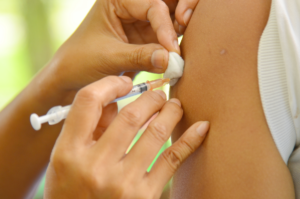
Many health concerns have been raised following the devastating floods that hurricane Harvey brought to Texas. Civilians and first responders have been wading through debris ridden flood waters which increase the possibility of disaster-related injuries. Due to the contaminated flood water, the risk of exposure to higher levels of bacteria that is normal is increased.
Because of these conditions, questions have been raised about the increased risk of contracting tetanus from wounds sustained in flood waters. According to CDC press officer Kristen Nordlund,” exposure to flood waters does not increase the risk of tetanus.” Michael Osterholm, Ph.D., PMH states that the idea that flooding and floating sharp objects in the flood waters increase the risk of tetanus is an old wives’ tale.

Tetanus, commonly known as lockjaw, is a serious bacterial infection that affects the nervous system leading to painful muscle contractions, particularly of the jaw and neck muscles. It can affect your ability to breath and be life-threatening. There is no cure for tetanus, but a vaccine is available. The current recommendation for adults is a tetanus booster every 10 years. For children, the CDC recommends a series of four shots to be given between 2 and 18 months, a booster shot at 4-6 years of age and another by 12.
Although the risk of contracting tetanus in floodwaters may not be increased any wounds sustained during disaster cleanup should be taken seriously. If you experience a wound injury and you are unsure of your tetanus vaccination status, you should get vaccinated according to Tom Skinner a spokesman for the CDC. The best tool to prevent tetanus is being up to date with your tetanus vaccine.
The TDSHS recently drafted guidance for immunization recommendations in a natural disaster. The major concern is for anyone exposed to unsanitary conditions be up to date with their tetanus vaccination. If an individual gets a puncture wound or a wound contaminated with feces, saliva, or soil a doctor or health department should determine whether a tetanus booster is necessary based on individual health records. For more information regarding vaccination go to https://www.cdc.gov/vaccines/vpd/tetanus.
